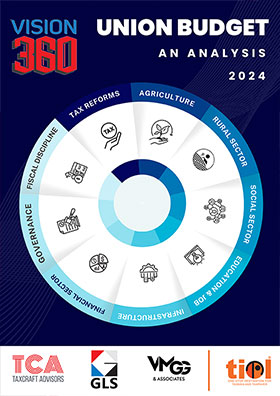TIOL - COB(WEB) - 142
JULY 02, 2009 By Shailendra Kumar, Editor THE Union Budget 2009 is only three days away. The Finance Minister's speech must be going through the last leg of proof-reading. If we leave aside the Part B which generally focuses on tax proposals, one futuristic statement which the entire nation, or at least the pragmatists in business houses and the academia, appear to be waiting for is going to be relating to the proposed Goods & Services Tax (GST). It has become almost certain that India is going to miss the April 1, 2010 deadline for GST. In this backdrop, it would indeed be interesting to see what roadmap the Finance Minister is going to roll out not only before the domestic industry but also the external sector which seems to be pinning high hope on this proposed reform of indirect taxes in India. For the Finance Minister, it is going to be a tough challenge to commit the Union Government to a future model and a concrete date. Since the Budget is a solemn announcement on the floor of the House, the Finance Minister would hopefully think twice before making a promise to the nation. However, he should not, at the same time, shy away from committing the UPA Government to the proposed reforms. It is equally important that the Minister does not seek shelter under rhetoric and oratories. It is a historic opportunity to put India in the global league of rising economic dragons like China. China has already achieved a unified VAT system, and it seems to be working well for its economy. There are multiple indicators of the same, and FDI is one of them. Going by the recommendations of the Empowered Committee of State FMs and the consensus views of the noted experts, a dual system of GST is argued to be better suited to the fiscal federalism provided by the Indian Constitution. The most common line of argument is that since our Constitution provides clear-cut powers to the Central Govt and the States to levy taxes, and the same is translated into reality with the aid of Union List, State List and Concurrent List, the dual system is the only feasible solution to bridge the gap or bring them together at one platform. One of the arguments is that even if the Constitution is amended to make legal space for a single GST, it would upset the fiscal federalism which is one of the cornerstones of the Indian polity. Another limitation that is often invoked by such experts is that the basic feature of the Constitution cannot be altered. Going by such arguments it appears that these experts have been digging for solutions first, and then set the 'goal' of a single or dual GST! The most logical approach would be to keep the goal in sight and then endeavour hard to evolve a solution which not only ensures political and federal harmony but is also futuristic and meets the needs of the economy. Let's take the example of WTO. What WTO has done in the past one decade is to emerge as a super-government at international arena. For all cross-border transactions its fiat runs uncurtailed. The legal framework and policy contours prescribed and agreed upon by its Members have got binding force, and it neutralises the concept of sovereignty of a nation. If a country decides to exercise its right to sovereignty and ignores the deadline for policy changes, fixed by WTO, a country runs the risk of being declared an economic pariah. And no country in today's globalised world can afford to remain isolated even for a week. In this case all directions coming from WTO Secretariat whether it dilutes the currency of sovereignty of a nation or neutralises it completely, has to be followed. In this backdrop of new global multilateral framework of governance, the concept of sovereignty has lost its meaning. Similarly, the concept of federalism automatically stands diluted if India has to emerge as a unified common market with minimal tax compliance cost to its business entities and prevention of cascading effect of input tax load. If India is aiming at becoming an economic superpower in the next two decades, it has got to adopt a futuristic tax model rather than indulging in short-term compromises with the whims of States ruled by political parties having 'local vision' which is going to be not less than a 'fiscal treason'! The Union Government should not give up on its demand for a single GST. It should also not look for a parallel in other continents as all those examples where dual system has been introduced pertain to a specific time period in the past, and a time will soon come when those countries will also be moving towards a unified GST regime. Merely because they could not achieve it in the past like Canada, it does not speak of their inability to do so in the future. India need not stop where some of the countries with similar federal structure had to stop because of the limitation of their historic forces if India has to stand out in the crowd of economically-muscled nations. It undoubtedly makes no sense that the Central Govt will have Central GST comprising of Central Excise and Service Tax, and States will have VAT, many local taxes and also perhaps power to levy tax on local services. This sort of fractured or multiple-levy-approach would once again countervail the efficacy of the new system and would pose teething problems for passing on credit for tax paid on input services. Let's take the example of what the Empowered Committee has to say about availment of input tax credit (ITC): ''Cross utilization of ITC between the Central GST and the State GST should not be allowed.'' If the idea is to minimise the cascading effect of input tax load on output, all efforts must be made to allow credit rather than artificially restrict it. Let's hope good sense prevails on the UPA Government and also squabbling State Finance Ministers who need to rise above their narrow interests to grab the right to tax and support the general cause for a single GST which alone can be said to be the attainment of the complete indirect tax reform. Let's hear what our Finance Minister has to say and then decide what India is heading for? |









 Download PDF
Download PDF




